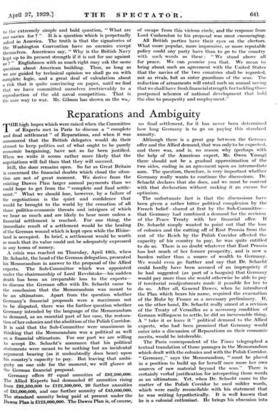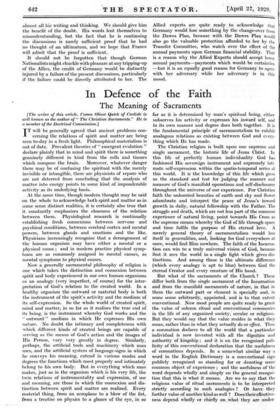Reparations and Ambiguity
THE high hopes which were raised when the Committee of Experts met in Paris to discuss a " complete and final settlement " of Reparations, and when it was announced that the British delegates would do their utmost to keep politics out of what ought to be purely economic bargaining, have not so far been justified. When we -write it seems rather more likely that the negotiations will fail than• that they will succeed.
Still, the door remains open. So far as Great Britain is concerned the financial doubts which cloud the situa- tion are not of great moment. We derive from the existing Dawes Plan larger annual payments than we could hope to get from the " complete and final settle- ment." . What we should lose, however, by a failure of the negotiations is the quiet and confidence that would be brought to the world by the cessation of all those politico-economic threats and intrigues of which we hear. so much and are likely to hear more unless a financial settlement is reached. For one thing, the immediate result of a settlement would be the healing of the German wound which is kept open while the Rhine- land is occupied. In brief, a settlement would be worth so much that its value could not be adequately expressed in any terms of money.
A- crisis was reached on Thursday, April 18th, when Dr. Schacht, the head of the German delegation, presented his Memorandum in answer to the proposal of the Allied experts. The Sub-Committee which was appointed under the chairmanship of Lord Revelstoke—his sudden death has been an irreparable loss to the experts— to discuss the German offer with Dr. Schacht came to the conclusion that the Memorandum was meant to be an ultimatum. Apart from the question whether Germany's financial proposals were a maximum not to be disputed, there was the further question whether Germany intended by the language of the Memorandum to demand, as an essential part of her case, the restora- tion of her colonies and the abolition of the Polish Corridor. It is said that the Sub-Committee were unanimous in thinking that the Memorandum was a political as well as a financial ultimatum. For our part we are willing to accept Dr. Schacht's assurance that his political statements were meant to be nothing but an incidental argument bearing (as it undoubtedly does bear) upon his country's capacity to pay. But leaving that ambi- guity on one side for the moment, we will glance at the German financial proposal.
Germany offers 87 equal annuities of £82,500,000. The Allied Experts had demanded 87 annuities rising from £92,500,000 to £122,500,000, 20 further annuities of £85,000,000, and one further annuity of £45,000,000. The standard annuity being paid at present under the Dawes Plan is £125,000,000. The Dawes Plan is, of course, no final settlement, for it has never been determined how long Germany is to go on paying this standard annuity.
Although there is .a great gap between the German offer and the Allied demand, that was only-to be expected, and there was, and is, no reason why (perhaps with the help of the American expert, Mr. Owen Young) there should not be a gradual approximation of the two sides, ending in an agreement upon an intermediate sum. The question, therefore, is very important whether Germany really wants to continue 'the discussions. Dr. Schacht declares that she does, and we must be content with that declaration without making it an excuse for optimism.
The unfortunate fact is that the discussions have been given a rather bitter political complexion by the French belief—shared at first by the Sub-Committee- that Germany had combined a demand for the revision of the Peace Treaty with her financial offer. If Dr.- Schacht simply wanted to point out that the loss of colonies and the 'cutting off of East Prussia from the rest of the Reich by the Polish Corridor affected the capacity of his country to pay, he was quite entitled to do so. There is no doubt whatever that East Prussia has lost much of her former prosperity, and is now a burden rather than a source of wealth to Germany. We would even go further and say that Dr. Schacht' could hardly have been accused of an impropriety if he had suggested (as part of a bargain) that Germany would pay more than she would otherwise be able to pay. if territorial readjustments made it possible for her to do so. After all, Genera/ Dawes, when he introduced the Plan which bears his name, required the evacuation of the Ruhr by France as a necessary preliminary. If; on the other hand, Dr. Schacht really aimed at a revision of the Treaty of Versailles as a necessary condition of German willingness to settle, he did an inexcusable thing. A " take it or leave it " political demand to the Allied experts, who had been promised that Germany 'would enter into a discussion of Reparations on their economic merits, would be intolerable.
The Paris correspondent of the Times telegraphed a textual translation of those passages in the Memorandum which dealt with the colonies and with the Polish Corridor. " Germany," says the Memorandum, " must be placed in a position to build up for herself once more her own sources of raw material beyond the seas." There is certainly verbal justification for interpreting those words as an ultimatum. Yet, when Dr. Schacht came to the matter of the Polish Corridor he used milder words, which were easily reconcilable with his statement that he was writing hypothetically. It is well known that he is a colonial enthusiast. He brings his obsession into almost all his writing and thinking. We ,should give him the benefit of the doubt. His words lent themselves to misunderstanding, but the fact that he is continuing the discussions is surely sufficient proof that he had no thought of an ultimatum, and we hope that France will admit that the proof is sufficient.
It should not be forgotten that though German Nationalists might chuckle with pleasure at any tripping-up of the Allies, the credit of Germany would be distinctly injured by a failure of the present discussions, particularly if the failure could be directly attributed to her. The Allied experts are quite ready to acknowledge that Germany would lose something by the change-over from the Dawes Plan, because with the Dawes Plan would also go the valuable protection afforded to her by the Transfer Committee, who watch over the effect of the annual payments upon German financial stability. That is a reason why the Allied Experts should accept lower annual payments—payments which would be certainties —but it is an equally good reason for Germany to agree with her adversary while her adversary is in this mood.









































 Previous page
Previous page